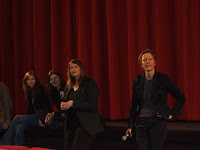
I have always loved the idea of being a cafe-goer, someone who lounges in a favourite corner, espresso in hand, cigarette blazing away, whiling away hours reading avant-garde literature while discreetly people-watching. The fact I don't smoke and coffee upsets my stomach has dealt this fantasy an almost-fatal blow. Nevertheless, I have visited a handful of cafes during my stay in Berlin which fulfill a social as well as gastronomic function.
First up, tucked away in Neukölln is The Dumpling Cafe, serving the titular product, much to the bemusement of patrons. When I visited at least three people stopped in just to ask what a dumpling is. Still, it's good to have an air of mystery, even for such a lowly foodstuff as the humble dumpling. The name alone conjures up the ultimate in comfort food. I well remember as a child visiting a certain cafe on the Lower East Side of New York once or twice a year to get my fill of blintzes and pierogis, the dumpling's eastern European cousin. These dumplings are on the small side but quite tasty. Other attractions are wi-fi access and a chess set. Reading material is less avant-garde and more lefty-feminist-queer, with a definite US slant: Mother Jones, Curve and Anschläge among them. The patrons, too, number quite a few expats. I heard a lot of English being spoken. It's a bit of a queer social space, with occasional performances and readings tucked into the small, cosy space. And on Wednesday nights, they show Cagney and Lacey.
Heading a bit north to Kreuzberg, one finds Tante Horst, a collectively run space which is quite friendly. Aside from tea, coffee and cake, one can also enjoy DJ performances. Reading matter includes Siegessäule and Stressfaktor.
And finally, up in Prenzlauerberg, there is the redoubtable and collectively-run Cafe Morgenrot, quite a large space. The service is a bit daunting. One orders at the counter and then the staff shout out the patron's name when the order is ready. One feels a bit like the naughty child in class being called before the teacher. Reading matter is definitely eclectic: Konkret, daily papers and the odd out-of-date music mag. There are also film screenings in the evenings.

![Reblog this post [with Zemanta]](http://img.zemanta.com/reblog_e.png?x-id=2c4b9369-5858-4afd-9afa-3c212bb2b8ea)

![Reblog this post [with Zemanta]](http://img.zemanta.com/reblog_e.png?x-id=c6324064-0651-491f-973f-0f4d2fba78f1)

![Reblog this post [with Zemanta]](http://img.zemanta.com/reblog_e.png?x-id=72d3a757-6400-4ec0-88d5-870c7bfd2246)

![Reblog this post [with Zemanta]](http://img.zemanta.com/reblog_e.png?x-id=4a142d5a-0857-4869-b3ea-eaae2d8ff5e0)

